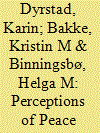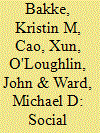|
|
|
Sort Order |
|
|
|
Items / Page
|
|
|
|
|
|
|
| Srl | Item |
| 1 |
ID:
134524


|
|
|
|
|
| Summary/Abstract |
De facto states, functional on the ground but unrecognized by most states, have long been black boxes for systematic empirical research. This study investigates de facto states’ internal legitimacy—people's confidence in the entity itself, the regime, and institutions. While internal legitimacy is important for any state, it is particularly important for de facto states, whose lack of external legitimacy has made internal legitimacy integral to their quest for recognition. We propose that the internal legitimacy of de facto states depends on how convincing they are to their “citizens” as state-builders. Using original data from a 2010 survey in Abkhazia, we examine this argument based on respondent perceptions of security, welfare, and democracy. Our findings suggest that internal legitimacy is shaped by the key Weberian state-building function of monopoly of the legitimate use of force, as well as these entities’ ability to fulfill other aspects of the social contract.
|
|
|
|
|
|
|
|
|
|
|
|
|
|
|
|
| 2 |
ID:
077270


|
|
|
| 3 |
ID:
143320


|
|
|
|
|
| Summary/Abstract |
Why are some ethnopolitical movements divided while others are relatively unified? A growing literature examines the consequences of internal divisions in ethnopolitical movements – and shows that it matters for a range of conflict outcomes – yet the mechanisms causing such divisions remain poorly understood. Our argument emphasizes competitive dynamics between states and self-determination movements and between rival factions within these movements as key determinants of fragmentation. Drawing from literatures on social movements, contentious politics, and civil war, we situate our argument vis-à-vis three alternative and complementary sets of explanations based on theories emphasizing transnational dimensions, political institutions, and structural factors within ethnopolitical groups. Using an original dataset, we test hypotheses explaining movement fragmentation over time and use a case study of Punjab in India to identify specific causal mechanisms and missing variables. Our findings show some support for three of these theories, suggesting that ethnopolitical movements divide as a result of complex and interactive processes. But our findings also underscore that central to explaining fragmentation dynamics are factors capturing competitive dynamics, including repression, accommodation of movement demands, the turn to violence, and the dynamic and changing nature of ethnopolitical demands.
|
|
|
|
|
|
|
|
|
|
|
|
|
|
|
|
| 4 |
ID:
131115


|
|
|
|
|
| Publication |
2014.
|
| Summary/Abstract |
One of the major policy concerns surrounding violent conflicts in Afghanistan, Iraq, Libya, Mali, Pakistan, Russia's North Caucasus region, Somalia, and Syria has been that these struggles may both attract and breed transnational insurgents, or foreign fighters. Yet despite this growing worry, relatively little is known about the ways in which transnational insurgents influence the domestic struggles they join. Existing scholarship assumes that such "outsiders" strengthen domestic opposition movements by bringing with them fighters, weapons, know-how, and access to financial resources. Indeed, access to such assets explains why domestic resistance leaders may initially welcome transnational insurgents. Foreign fighters, however, can also weaken domestic insurgencies by introducing new ideas regarding their objectives and how these struggles should be waged. The introduction of new goals and tactics can not only create divisions with opposition movements, but can also complicate the ability of local leaders to attract and maintain vital public support. Domestic resistance leaders' willingness and ability to adapt the ideas of transnational insurgents to local conditions is key to determining whether and how foreign fighters strengthen homegrown insurgencies.
|
|
|
|
|
|
|
|
|
|
|
|
|
|
|
|
| 5 |
ID:
179553


|
|
|
|
|
| Summary/Abstract |
(Re)gaining citizens’ trust is a challenge for post-war governments. Political trust is crucial for understanding both the risk of civil war in the first place and the state-society relationships that emerge afterwards. Peace agreements are tools to stop the fighting, address war’s injustices, and provide a blueprint for the state’s future – and they do so to varying degrees. Yet we have little systematic knowledge of how people react to such agreements and with what consequences. We argue that in post-war societies, people’s perceptions of the strategies aimed at ending the violence and (re)building the state have an enduring impact on people’s view of the state. In this study, we examine the association between post-conflict political trust and people’s approval of peace agreements analyzing a set of nationally representative, comparative surveys from Guatemala, Nepal, and Northern Ireland, three cases where long civil wars were ended by peace agreements. We find that individuals’ approval of the agreement and the perception that it has been implemented are positively associated with political trust, and that accounting for views of the peace agreement substantially improve on conventional explanations for political trust.
|
|
|
|
|
|
|
|
|
|
|
|
|
|
|
|
| 6 |
ID:
098408


|
|
|
|
|
| Publication |
2010.
|
| Summary/Abstract |
Large-n studies of conflict have produced a large number of statistically significant results but little accurate guidance in terms of anticipating the onset of conflict. The authors argue that too much attention has been paid to finding statistically significant relationships, while too little attention has been paid to finding variables that improve our ability to predict civil wars. The result can be a distorted view of what matters most to the onset of conflict. Although these models may not be intended to be predictive models, prescriptions based on these models are generally based on statistical significance, and the predictive attributes of the underlying models are generally ignored. These predictions should not be ignored, but rather need to be heuristically evaluated because they may shed light on the veracity of the models. In this study, the authors conduct a side-by-side comparison of the statistical significance and predictive power of the different variables used in two of the most influential models of civil war. The results provide a clear demonstration of how potentially misleading the traditional focus on statistical significance can be. Until out-of-sample heuristics - especially including predictions - are part of the normal evaluative tools in conflict research, we are unlikely to make sufficient theoretical progress beyond broad statements that point to GDP per capita and population as the major causal factors accounting for civil war onset.
|
|
|
|
|
|
|
|
|
|
|
|
|
|
|
|
| 7 |
ID:
121584


|
|
|
|
|
| Publication |
2012.
|
| Summary/Abstract |
How do we conceptualize the fragmentation of internally divided movements? And how does variation in fragmentation affect the probability and patterns of infighting? The internal politics of non-state groups have received increasing attention, with recent research demonstrating the importance of cohesion and fragmentation for understanding conflict dynamics. Yet there is little consensus on how to conceptualize fragmentation, the concept at the center of this agenda, with authors using different definitions and measures. In this paper we conceptualize fragmentation along three constitutive dimensions: the number of organizations in the movement; the degree of institutionalization across these organizations; and the distribution of power among them. We then show how variation across these dimensions can explain variation in important conflict processes, focusing on infighting.
|
|
|
|
|
|
|
|
|
|
|
|
|
|
|
|
| 8 |
ID:
112857


|
|
|
|
|
| Publication |
2012.
|
| Summary/Abstract |
While theoretical models of conflict often treat actors as unitary, most self-determination groups are fragmented into a number of competing internal factions. This article presents a framework for understanding the "dual contests" that self-determination groups engage in-the first with their host state and the second between co-ethnic factions within groups. Using a new data set of the number of factions within a sample of self-determination groups from 1960 to 2008, the authors find that competition between co-ethnic factions is a key determinant of their conflict behavior. More competing factions are associated with higher instances of violence against the state as well as more factional fighting and attacks on co-ethnic civilians. More factions using violence increases the chances that other factions will do so, and the entry of a new faction prompts violence from existing factions in a within-group contest for political relevance. These findings have implications for both theory and policy.
|
|
|
|
|
|
|
|
|
|
|
|
|
|
|
|
| 9 |
ID:
086960


|
|
|
|
|
| Publication |
2009.
|
| Summary/Abstract |
This article examines attitudinal differences and similarities among ethnic groups in conflict-affected societies. Conventional wisdom tells us that societies that have experienced violent struggles in which individuals of different ethnic groups have (been) mobilized against each other are likely to become polarized along ethnic lines. Indeed, both policy-makers and scholars often assume that such divisions are some of the main challenges that must be overcome to restore peace after war. We comparatively examine this conventional wisdom by mapping dimensions of social distance among 4,000 survey respondents in Bosnia-Herzegovina and the North Caucasus region of Russia. The surveys were carried out in December 2005. Using multidimensional scaling methods, we do not find patterns of clear attitudinal cleavages among members of different ethnic groups in Bosnia-Herzegovina. Nor do we find patterns of clear ethnic division in the North Caucasus, although our social distance matrices reveal a difference between Russians and ethnic minority groups.
|
|
|
|
|
|
|
|
|
|
|
|
|
|
|
|
| 10 |
ID:
171838


|
|
|
|
|
| Summary/Abstract |
Research suggests that civil society mobilization together with the ratification of human rights treaties put pressure on governments to improve their human rights practices. An unexplored theoretical implication is that pressure provokes counterpressure. Instead of improving treaty compliance, some governments will have an interest in demobilizing civil society to silence their critics. Yet we do not know how and to what extent this incentive shapes governments’ policies and practices regarding civil society organizations. In this article we argue and show—using a new global database of government-sponsored restrictions on civil society organizations—that when governments have committed to human rights treaties and, at the same time, continue to commit severe human rights abuses, they impose restrictions on civil society groups to avoid monitoring and mitigate the international costs of abuses.
|
|
|
|
|
|
|
|
|
|
|
|
|
|
|
|
|
|
|
|
|